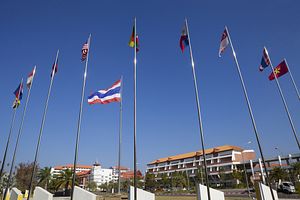Recent weeks have brought forth a slew of unfortunate developments for the “land of smiles,” as Thailand likes to brand itself. Political turmoil – first in the form of a half-coup on May 20, when General Prayuth Chan-ocha declared martial law, and then finally the full seizure of power by the army on May 22 – has led to some alarming developments. These events should be of special concern to Thailand’s Southeast Asian neighbors, with which Thailand forms the Association of Southeast Asian Nations (ASEAN).
Thailand is one of the most active and central players in ASEAN, representing Southeast Asia’s second biggest economy. This coup is far from uncommon news for Thailand. In fact, it constitutes the twelfth effective coup d’état in Thailand since 1932, besides seven other attempts. The pattern of political instability that Thailand has shown over the last couple of years seems almost continuous, and one could argue that the country’s regional neighbors are somehow used to these ups and downs in the Thai political landscape. However, the fact that the very popular, and in the past conciliatory, King Bhumibol Adulyadej seems to have stayed out of the game this time makes this coup special, with the route back to stability and democracy much more uncertain.
Why should we expect any ASEAN comment at all though, since ASEAN prefers to stress the policy of non-interference and a hands-off approach concerning member states’ domestic issues? The answer is that the non-interference norm has lately seen some recalibration. Domestic issues that have regional implications, or the potential to threaten regional stability and security, are no longer taboo. Instead, facing comments by other ASEAN members might be tolerable or acceptable. One prominent example was the ASEAN response to cyclone Nargis in 2008 in Myanmar.
Concerning Thailand, the ASEAN Heads of State and Government issued an official statement on December 14, 2013, calling “on all parties concerned to resolve the current situation through dialogue and consultations in a peaceful and democratic manner.” Although the statement could be interpreted as pro-government, it nonetheless stands out as a noticeable peak in ASEAN’s cherished principle of non-interference with the internal affairs of its member states. With the army’s seizure of power, the situation in Thailand has not been solved through dialogue, consultations or in a democratic manner. ASEAN should thus follow-up its December statement, especially because it’s expressions of democracy are also backed by principles in the 2008 ASEAN Charter. In this document, the organization subscribed to the ideas of democracy, human rights and the rule of law. Certainly, critics of the association have denounced the gap between ASEAN’s identity on paper, and its actions when faced with real situations. The question for ASEAN therefore, is whether it wants to live up to its self-ascribed standards, or continue to just pay lip-service.
Indonesia, nowadays often described as the custodian of human rights and democracy in ASEAN, has already taken an active line. On May 22, the Indonesian Foreign Minister Marty Natalegawa said: “Without meaning to intervene in the domestic affairs of Thailand… the development of the situation [there] should be a concern of Indonesia, together with the Asean.” Another factor in ASEAN’s view of the situation should be that Myanmar, a direct neighbor of Thailand, has just turned toward democracy. ASEAN countries such as Indonesia and the Philippines, traditionally the most supportive of pro-democracy developments within ASEAN, might also have a strong interest in Thailand going back toward democracy as soon as possible, so as not threaten the new and still fragile developments in Myanmar.
Regionally and internationally, the human rights situation and the further deterioration of Thai democracy were viewed with concern. UN High Commissioner for Human Rights Navi Pillay expressed her deepest concern about the situation in Thailand. Several other non-governmental, regional and international organizations like the EU, the International Federation for Human Rights (FIDH) and the Southeast Asian Press Alliance (SEAPA), have strongly condemned the military’s seizure of power. The situation on May 20, when the army launched its “half-coup,” did not justify the imposition of martial law, which severely restricted human rights, civil liberties and media freedom. Considering these developments, it will be interesting to observe whether an ASEAN voice will also be heard in the current discussion of the “Thai fight.”
Kerstin Radtke is a Research Assistant at the University of Konstanz, Germany.

































